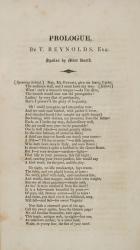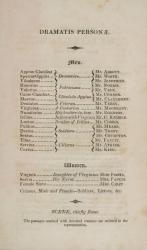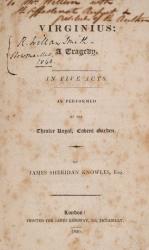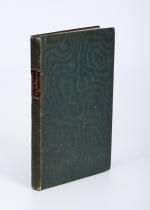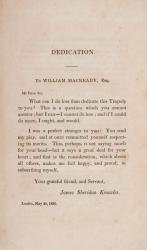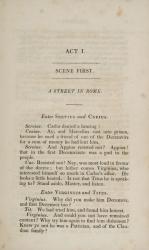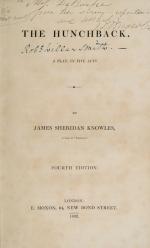Knowles, Virginius - A Tragedy. In Five Acts. As Performed at the Theatre Royal,
Virginius – A Tragedy. In Five Acts. As Performed at the Theatre Royal, Covent Garden. (First Edition, 1820) / Bound together with: The Hunchback – A Play in Five Acts (Fourth Edition, 1832). [Presentation copy / Signed copy]
Two Volumes in One. London, Printed for James Ridgway, 1820. Octavo. Pagination: Virginius – 85, (3) pages / Hunchback – VIII, (2), 118 pages. Hardcover / Original, contemporary green cloth with original red morocco label to spine. The Volume is now in protective Mylar. Stronger signs of foxing to “Virginius” but still in very good condition. Inscribed by James Sheridan Knowles to one Robert Willan Smith on the titlepage:″To Mr. Willan with the affectionate Respect + Gratitude of the Author”. Sheridan Knowles had a chance to be Willan’s successor but decided for a literary and acting career. / “The Hunchback” in excellent condition, also with inscription and signature of Knowles on the titlepage and with the ownership-inscription of Robert Willan Smith. Rare Cork related !
James Sheridan Knowles (12 May 1784 – 30 November 1862) was an Irish dramatist and actor.
Knowles was born in Cork. His father was the lexicographer James Knowles (1759–1840), cousin of Richard Brinsley Sheridan. The family moved to London in 1793, and at the age of fourteen Knowles published a ballad entitled The Welsh Harper, which, set to music, was very popular. His talents secured him the friendship of William Hazlitt, who introduced him to Charles Lamb and Samuel Taylor Coleridge. He served for some time in the Wiltshire and afterwards in the Tower Hamlets militia, leaving the service to become a pupil of Dr Robert Willan (1757–1812). He obtained the degree of M.D., and was appointed vaccinator to the Jennerian Society.
Although Dr Willan offered him a share in his practice, Knowles decided to give up medicine for the stage, making his first appearance as an actor probably at Bath, and played Hamlet at the Crow Theatre, Dublin. At Wexford he married, in October 1809, Maria Charteris, an actress from the Edinburgh Theatre. In 1810 he wrote Leo, a successful play in which Edmund Kean appeared; another play, Brian Boroihme, written for the Belfast Theatre in the next year, attracted crowds; nevertheless, Knowles’s earnings were so small that he was obliged to become assistant to his father at the Belfast Academical Institution. In 1817 he moved from Belfast to Glasgow, where, besides keeping a flourishing school, he continued to write for the stage.
His first important success was Caius Gracchus, produced at Belfast in 1815; and his Virginius, written for William Charles Macready, was first performed in 1820 at Covent Garden. In William Tell (1825), Knowles wrote for Macready one of his favourite parts. His best-known play, The Hunchback, was produced at Covent Garden in 1832, and Knowles won praise acting in the work as Master Walter. The Wife was brought out at the same theatre in 1833; and The Love Chase in 1837.
In his later years he forsook the stage for the pulpit, and as a Baptist preacher attracted large audiences at Exeter Hall and elsewhere. He published two polemical works: the Rock of Rome and the Idol Demolished by Its Own Priests in both of which he combated the special doctrines of the Roman Catholic Church. Knowles was for some years in the receipt of an annual pension of £200, bestowed by Sir Robert Peel in 1849. In old age he befriended the young Edmund Gosse, whom he introduced to Shakespeare. Knowles makes a happy appearance in Gosse’s Father and Son. He died at Torquay on 30 November 1862. He is buried under a huge tomb at the summit of the Glasgow Necropolis.
- Keywords: Catalogue Irish History Six – General Irish History · Catalogue No.10 – International Literature · Catalogue Ten – International Literature · Cork · Cork Author · Cork City · Cork History · Drama – Rare · Inscribed · Irish Literature · Irish Literature – Rare · Irish Local History · Presentation-Copy · Signed · Theatre – Rare
- Language: English
- Inventory Number: 29416AB
EUR 380,--
© 2025 Inanna Rare Books Ltd. | Powered by HESCOM-Software





